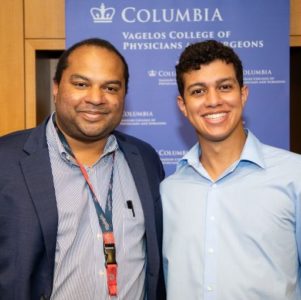 This summer, the American Urological Association awarded Joseph Marte, M1 student at CUNY School of Medicine and health policy intern at the Associated Medical Schools of New York (AMSNY), a student fellowship to conduct research with Dr. Gregory Joice at Columbia University Irving Medical Center. AUA’s Summer Medical Student Fellowship Program creates an opportunity for a small group of exemplary medical students to pursue urology research alongside world-class urologic scientists. Marte’s fellowship is sponsored by AUA New York Section.
This summer, the American Urological Association awarded Joseph Marte, M1 student at CUNY School of Medicine and health policy intern at the Associated Medical Schools of New York (AMSNY), a student fellowship to conduct research with Dr. Gregory Joice at Columbia University Irving Medical Center. AUA’s Summer Medical Student Fellowship Program creates an opportunity for a small group of exemplary medical students to pursue urology research alongside world-class urologic scientists. Marte’s fellowship is sponsored by AUA New York Section.
Marte has been connected with AMSNY since his experience with the Staten Island University Hospital’s Physician Career Enhancement Program, and began interning with the organization in 2020, focusing on health policy. During his time with the organization, he has played a vital role in engaging medical students in studies conducted by AMSNY, exploring the components of diversity in medicine pipeline programs, as well as students’ reactions to changes in curriculum during the pandemic. He also contributed to the development of focus groups for an AMSNY symposium on improving diversity among basic-science researchers.
His AUA research project is focused on the health impacts of priapism (prolonged erection of the penis) and disparities of care in treatment of this urologic emergency. Using data from several large national and state databases, he is using statistical software to look at emergency room use, surgery outcomes, and more to find trends in treatment. The goal is for Marte to author a paper that would be accepted to present findings at a conference.
Dr. Joice, Marte’s mentor and supervisor on the project, said this kind of immersive research experience is extremely valuable in preparing for a medical career and applying to residency programs.
“I started my path towards urology around the same time Joe did, and learned the same kind of research processes—building skills like acquiring data, summarizing, and presenting information that continue to pay dividends,” said Dr. Joice, an assistant professor of urology at Columbia University Vagelos College of Physicians and Surgeons. “The foundation he’s building this summer can be applied to any number of projects, and before he knows it will be an expert in this area of urological research.”
Faculty mentors play an important role in medical education, which is one of a handful of fields that still apply an apprenticeship approach to training.
“The guidance from mentors is invaluable, when they have already been through what you are going through,” said Marte. “To have them able to share based on their own experience, makes achieving your goals seem so much more plausible.”
